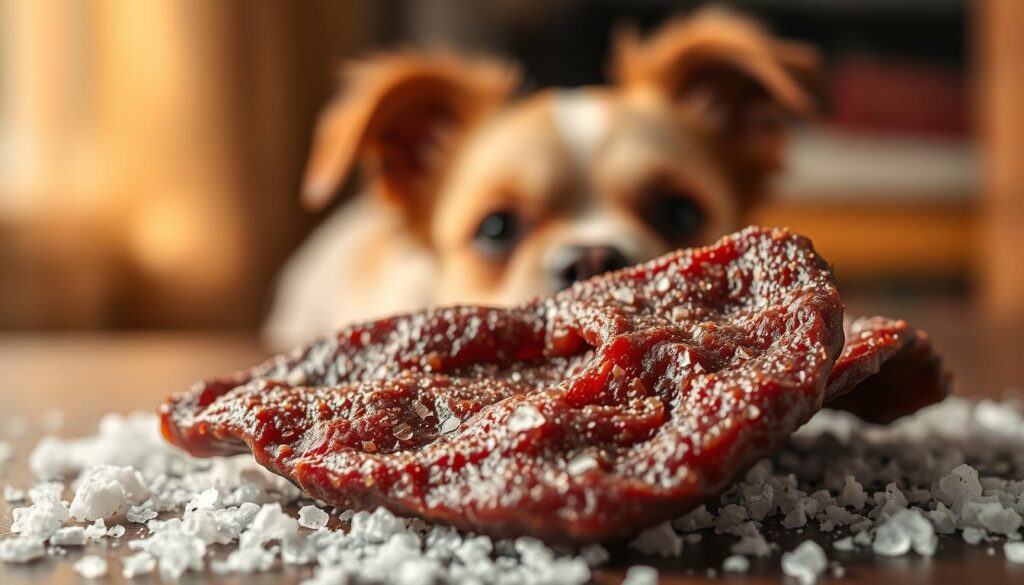As a devoted dog parent, you only want the best for your furry friend. Treats and snacks are a fun way to show love. But, beef jerky is not as safe as it seems.
Beef jerky might look tempting, but it can harm your dog. It’s important to know the risks before giving it to them. This guide will help you understand why beef jerky is not always safe for dogs.
Table of Contents
Understanding Beef Jerky: What’s Inside This Popular Snack
Beef jerky is a favorite snack for many, loved for its strong taste and chewy texture. But before giving it to your dog, it’s important to know what’s in it. Knowing the ingredients in commercial beef jerky helps keep your dog safe.
Traditional Preparation Methods
Beef jerky used to be made by marinating thin beef slices in spices, salt, and sometimes sugar. Then, it was dried slowly at low temperatures. This kept the meat’s natural taste and softness. Now, many use dehydrators or ovens to dry it faster.
Common Ingredients in Commercial Beef Jerky
Traditional jerky is just pure beef. But commercial jerky often has preservatives, additives, and lots of salt. Ingredients like sodium nitrite, BHA, and BHT can be harmful to dogs if they eat too much.
Nutritional Content Analysis
Beef jerky is mostly protein and very little fat. This makes it a good snack choice. But, the preservatives, seasonings, and salt in commercial jerky can be bad for dogs.
It’s key to know what’s in beef jerky to decide if it’s safe for your dog. Knowing how it’s made, what’s in it, and its nutritional value helps you choose the right snacks for your pet.
Can Dogs Eat Beef Jerky: A Detailed Safety Guide
Plain beef is safe for dogs, but most beef jerky is not. The main issues are high salt, toxic seasonings, and preservatives. These can harm your dog’s health.
Beef jerky dog treats often have too much salt. This can cause dehydration, vomiting, and diarrhea. It’s especially dangerous for small dogs. Signs of salt poisoning include shaking, seizures, and can be fatal.
| Ingredient Concern | Health Risks | Symptoms |
|---|---|---|
| Onion and Garlic | Toxicity | Vomiting, diarrhea, lethargy, decreased appetite, anemia |
| Preservatives (Nitrates, Nitrites, BHA, BHT) | Digestive problems, allergic reactions, serious health issues | Varied, depending on the specific preservative |
| High Sodium Levels | Dehydration, sodium ion poisoning | Vomiting, diarrhea, tremors, seizures, potentially fatal |
Many beef jerky products also have onions and garlic, which are bad for dogs. These can cause stomach problems, anemia, and serious health issues. Always check the ingredients and avoid beef jerky dog treats with these.
Before giving your dog beef jerky, talk to your vet. They can help choose safe treats and the right amount for your dog.
The Hidden Dangers of Store-Bought Beef Jerky
Beef jerky might look like a tasty snack for dogs, but many store-bought kinds are not safe. They can have harmful ingredients like dangerous seasonings and too much salt. It’s important to know the risks in commercial beef jerky.
Toxic Ingredients to Watch For
Ingredients like onion and garlic powders, and xylitol, are bad for dogs. They can cause serious health problems, including anemia and liver failure. These can also upset your dog’s stomach.
Health Risks from Additives and Preservatives
Commercial beef jerky also has preservatives like nitrates and BHA/BHT. These can increase the risk of cancer and other health issues. It’s not good for your dog’s health.
Signs of Adverse Reactions
If your dog eats store-bought beef jerky, watch for signs like vomiting and diarrhea. They might also seem tired or have pale gums. Severe cases can lead to seizures or collapse. If you see these signs, get your dog to the vet right away.
Remember, the dangers of store-bought beef jerky are not worth it for your dog. It’s safer to choose dog-safe snacks or make your own jerky. This way, you can control what goes into it.
Salt Content and Its Effects on Canine Health
Feeding your dog treats is important, but watch the salt. Human beef jerky has a lot of sodium, bad for dogs. Too much salt can cause dehydration, more thirst, and even sodium poisoning.
Signs of sodium poisoning in dogs include vomiting, diarrhea, and seizures. Even a small amount can harm a big dog. It’s key to keep salt out of your dog’s diet to avoid these dangers.
| Sodium Poisoning Symptoms | Sodium Intake Risks |
|---|---|
|
|
Remember, the beef jerky salt content can harm your dog. Limiting their sodium intake and knowing the signs of sodium poisoning in dogs keeps them safe and healthy.

Toxic Seasonings: Garlic, Onion, and Other Harmful Ingredients
When choosing dog treats, it’s important to watch out for harmful ingredients. Garlic and onion, found in some beef jerky, are especially dangerous for dogs.
Common Seasonings to Avoid
Onions and garlic have a compound called thiosulfate. This can harm red blood cells in dogs, leading to hemolytic anemia. Even a little bit can be dangerous, so avoid any beef jerky with them.
Xylitol, a sugar substitute, can cause blood sugar drops and liver damage in dogs. Spices like nutmeg and cayenne pepper can upset a dog’s stomach.
Symptoms of Seasoning Toxicity
If your dog eats seasoned beef jerky, watch for signs of poisoning. Look for vomiting, diarrhea, weakness, and pale gums. These symptoms can show up quickly and need immediate attention.
Emergency Response Guidelines
If you think your dog ate seasoned beef jerky, call your vet or a pet poison hotline right away. Don’t wait for symptoms to show up. Early action is key for a good outcome. Your vet might suggest making your dog vomit or giving other treatments to stop the toxin.
Always put your dog’s safety first when it comes to their food. Being careful about what treats you give can keep them happy and healthy.
Safe Alternatives to Commercial Beef Jerky
Commercial beef jerky might look tempting for your dog, but it’s often not safe. It has too much sodium, preservatives, and other harmful stuff. Luckily, there are better choices that let your dog enjoy jerky without health risks.
Look for dog-safe beef jerky made just for dogs. These treats use lean meat, few additives, and less sodium. You can also make homemade beef jerky without bad stuff. This way, you control what goes into it, making it perfect for your dog.
Pet jerky made for dogs is another good option. It uses safe proteins like chicken or turkey. It also avoids things that can upset dogs, like onions and garlic.
- Make sure treats don’t make up more than 10% of your dog’s daily calories. This helps prevent weight gain and health problems.
- Always check the ingredients and talk to your vet before giving new treats to your dog.
By trying these beef jerky alternatives for dogs, you can give your dog a tasty, safe snack. It meets their jerky cravings without harming their health.

Making Dog-Safe Beef Jerky at Home
Making homemade beef jerky for your dog is easy and safe. It’s a great way to give them a healthy snack. Unlike store-bought jerky, you can control what goes into it.
Recipe and Preparation Steps
To make dog-safe beef jerky, use lean, high-quality beef. Don’t add any seasonings, salts, or harmful ingredients. Cut the meat into thin strips, about 1/4 inch thick.
- Preheat your oven to 175°F (80°C) or use a food dehydrator.
- Put the beef strips on a baking sheet or dehydrator tray lined with parchment paper.
- Dehydrate the beef for 3-4 hours until it reaches 160°F (70°C).
- Let the homemade dog beef jerky cool completely before storing.
Storage and Serving Guidelines
Your DIY dog treats can last up to two weeks in an airtight container. For longer storage, refrigerate for up to four weeks or freeze for months.
Give your dog the homemade dog beef jerky in small amounts as an occasional treat. Always watch them to avoid choking hazards.
Recognizing Allergic Reactions to Beef Products
As pet owners, it’s key to know that dogs can get allergies to foods like beef jerky. Beef allergy in dogs is caused by proteins like albumin and globulin. This triggers a strong immune response. Factors like genetics, early exposure, and health conditions can lead to beef allergies in dogs.
If your dog shows signs like itching, hives, or stomach problems, it might have a beef allergy. In bad cases, anaphylaxis can happen. Your vet might do tests like Intradermal Skin Testing or an Elimination Diet Trial to find out. Treatment usually means changing their diet and using antihistamines and corticosteroids.
Beef allergies can cause skin issues, digestive problems, and mood changes in dogs. These allergies can also harm a dog’s liver. To avoid and manage beef allergies, use protein alternatives like hydrolyzed proteins or novel sources like venison or fish.
Understanding the signs of beef allergies in dogs and acting quickly can help your pet live a happy, healthy life. This way, they won’t suffer from the discomfort and distress of this common food allergy.
How to Choose Dog-Friendly Jerky Treats
When picking dog-friendly jerky treats, safety is key. Look for treats made just for dogs. They should not have harmful ingredients that could harm your dog.
Check the ingredients list first. Avoid jerky with added salt, preservatives, or seasonings like garlic and onion. These can be dangerous for dogs. Choose treats with simple, natural ingredients that fit your dog’s diet.
- Opt for jerky from high-quality, lean proteins like beef, chicken, or turkey.
- Make sure the jerky’s texture and size won’t be a choking hazard for your dog.
- Start with small amounts of new treats and watch for any bad reactions.
By carefully picking safe dog jerky, you give your dog a tasty, healthy treat. It helps keep them healthy and happy. Always prioritize quality and safety when picking dog treats.
| Brand | Protein Source | Ingredients | Reviews | Price |
|---|---|---|---|---|
| Tylee’s Human-Grade Chicken Jerky Dog Treats | Chicken | 76% chicken, natural | Positive reviews from thousands of dog owners | $22.99 for 12 oz |
| Triumph Salmon & Sweet Potato Jerky Dog Treats | Salmon | Grain-free, natural ingredients | High ratings for quality and taste | $14.99 for 4 oz |
| Bones & Chews All-Natural Turkey Dog Jerky Treat | Turkey | 8 natural ingredients sourced from the USA | Thousands of positive reviews from dog owners | $9.99 for 4 oz |
Conclusion
It might be tempting to share beef jerky with your dog. But, it’s not a good idea. Commercial beef jerky has too much salt, harmful seasonings, and preservatives. These can be very bad for your dog’s health.
For your dog’s safety, choose dog treats or make your own beef jerky without seasonings. This way, you can give your dog treats that are safe and healthy. Just remember, treats should only be 10% of their daily food.
Always talk to your vet about what food is best for your dog. By choosing beef jerky dog safety, following dog treat guidelines, and being careful with responsible pet feeding, you can keep your dog happy and healthy for a long time.

